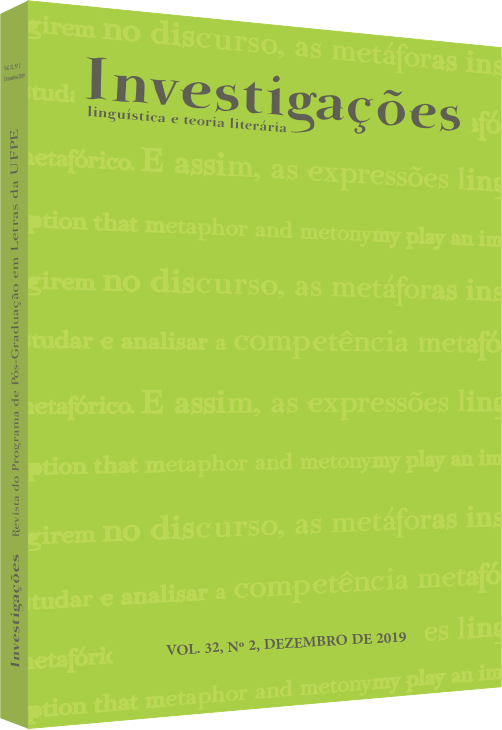Línguas estrangeiras e outras relações possíveis com a escola pública
DOI:
https://doi.org/10.51359/2175-294x.2019.241740Keywords:
literacy, foreign languages, language policies, public school.Abstract
The construction of linguistic knowledge in Brazilian education has been a necessary theme for the reflection on citizen formation policies. Given the current scenario, which brings challenges to the teaching and learning of foreign languages (LE), especially for basic education, the objective is to discuss about different possibilities of relationship between languages and public school. From the reading of the BNCC (2017), we propose the discussion of issues related to teacher education and working with LE from the perspective of literacy, supporting us in Street (2014) and Soares (2017). Regarding language policies, we use Calvet (2007) and Rajagopalan (2011).References
AUBIN, S. & GALLI, J. 2015. Motiver à l’enseignement du français au Brésil. In : Le Français Dans Le Monde. Numéro 397/Janvier-Février. Paris: CLE International. P. 34 et 35.
BLANCHET, P. CHARDENET, P. Guide pour la recherche en didactique des langues et des cultures. Approches contextualisées. Paris: Éditions des Archives Contemporaines, 2011.
BOHN, H. I. As exigências da pós-modernidade sobre a pesquisa em Linguística Aplicada no Brasil. In: FREIRE, M. et al. Linguística Aplicada e Contemporaneidade. São Paulo: ALAB; Campinas, SP: Pontes Editores, 2005, p. 11-23.
BRASIL. Ministério da Educação. Base nacional comum curricular. Brasília, DF: MEC, 2017. Disponível em: < http://basenacionalcomum.mec.gov.br/>. Acesso em: 28 ago. 2018.
BRASIL. Ministério da Educação. Ministério da educação. Secretaria da Educação Média e Tecnológica. Parâmetros Curriculares Nacionais: Ensino Fundamental. Brasília: Ministério da Educação, 1998.
BRASIL. Ministério da Educação. Orientações Curriculares para o Ensino Médio: Linguagens, Códigos e suas Tecnologias. Brasília. Ministério da Educação, 2006.
BUNZEN, Clécio. Apresentação. In: STREET, Brian. Letramentos sociais. Trad. Marcos Bagno. São Paulo: Parábola Editorial, 2014.
CALVET, L-J. As políticas linguísticas. São Paulo: Parábola Editorial: IPOL, 2007.
CHAURAUDEAU, P. Les stéréotypes, c’est bien. Les imaginaires, c’est mieux in Boyer H. (dir.), Stéréotypage, stéréotypes : fonctionnements ordinaires et mises en scène, L’Harmattan, Paris, 2007.
COLEÇÃO PROFESSOR CARLOS MACIEL : Subsídios para organização da prática pedagógica nas escolas. Língua Inglesa. Secretaria de Educação e Esportes. Diretoria de Educação Escolar. Recife, 1997.
ESTADO DE PERNAMBUCO. Parâmetros para a Educação Básica de Pernambuco. Secretaria de Estado de Educação, 2013.
ESTADO DE PERNAMBUCO. Orientações Teórico Metodológicas para o Ensino Médio. Secretaria de Estado de Educação, 2012.
GALLI, J. A. Des représentantions culturelles dans l’enseignement-apprentissage de français: la langue comme signe d’altérité dans le programme Brafitec. In : Mobilités, Réseaux et interculturalités, nouveaux défis pour la recherche scientifique et la pratique professionnelle. Collections Espaces Interculturels. Orgs. COSTA-FERNANDEZ, DENOUX et LESCARRET. Éditions de L’Harmattan, 2018, p. 249-260.
GALLI, J. A. La notion d’interculturel et l’enseignement-apprentissage des langues étrangères au Brésil: représentations et réalités du français. In: Synergies Brésil – Territoires et expériences de la francophonie en Amérique du Sud et ailleurs. Número 12, GERFLINT, 2017a, p. 81-102.
http://gerflint.fr/Base/Bresil12/armani_galli.pdf
GALLI, J. A. Línguas estrangeiras: formação e pesquisa nas Letras, consciência política e social. In: GELNE 40 ANOS: experiências teóricas e práticas nas pesquisas em Linguística e Literatura. São Paulo: Blucher, 2017b, p. 231-252.
file:///C:/Users/Joice%20Armani%20Galli/Downloads/1373.pdf
GALLI, J. A. As línguas estrangeiras como política de educação pública plurilíngue. In: GALLI et al. Línguas que botam a boca no mundo: reflexões sobre teorias e práticas de línguas. Recife: EDUFPE, 2011. p. 15 - 36.
LAGARES, X. C. Qual política linguística? Desafios glotopolíticos contemporâneos. São Paulo: Parábola Editorial, 2018.
LEFFA, Vilson J. O ensino de línguas estrangeiras no contexto nacional. Contexturas, APLIESP, n.4, p. 13 – 24, 1999.
LIBERALI, F. C. Atividade Social nas aulas de língua estrangeira. São Paulo: Moderna, 2009.
MARCUSCHI, L. A. Produção textual, análise de gêneros e compreensão. 3 ed. São Paulo: Parábola, 2008.
MOITA LOPES, L.P. Por uma linguística indisciplinar. São Paulo: Parábola Editorial, 2006.
RAJAGOPALAN, K. Vencer barreiras e emergir das adversidades com pleno êxito, sempre com o pé no chão. In: LIMA, DC de. Inglês em escolas públicas não funciona. Uma questão, múltiplos olhares. São Paulo: Parábola Editorial, 2011, p. 55 – 65.
SILVA, T.T. Documentos de identidade: uma introdução às teorias do currículo. Belo Horizonte: Autêntica, 2000.
SOARES, M. Alfabetização e letramento. São Paulo: Editora Contexto, 2017.
SOUZA et al. A área de política e planejamento linguístico: as práticas de pesquisa. In: ATAÍDE, C. Cartografia das pesquisas em linguística e literatura no NE: um mapeamento das microáreas. São Paulo: Editora Contexto, 2019 (no prelo)
STREET, B. Letramentos sociais: abordagens críticas do letramento no desenvolvimento, na etnográfica e na educação. São Paulo: Parábola Editorial. 2014.
Downloads
Published
How to Cite
Issue
Section
License
Copyright (c) 2019 Elizabeth Camelo, Joice Armani Galli

This work is licensed under a Creative Commons Attribution 4.0 International License.
Authors who publish with Revista Investigações agree to the following terms:
Authors retain copyright and grant the journal right of first publication with the work simultaneously licensed under the Creative Commons Attribution 4.0 International (CC BY 4.0) license that allows others to share the work with an acknowledgement of the work's authorship and initial publication in this journal.
Authors are able to enter into separate, additional contractual arrangements for the non-exclusive distribution of the journal's published version of the work (e.g., post it to an institutional repository or publish it in a book), with an acknowledgement of its initial publication in this journal.
You are free to:
Share — copy and redistribute the material in any medium or format for any purpose, even commercially.
Adapt — remix, transform, and build upon the material for any purpose, even commercially.
The licensor cannot revoke these freedoms as long as you follow the license terms.
Under the following terms:
Attribution — You must give appropriate credit , provide a link to the license, and indicate if changes were made . You may do so in any reasonable manner, but not in any way that suggests the licensor endorses you or your use.
No additional restrictions — You may not apply legal terms or technological measures that legally restrict others from doing anything the license permits.

